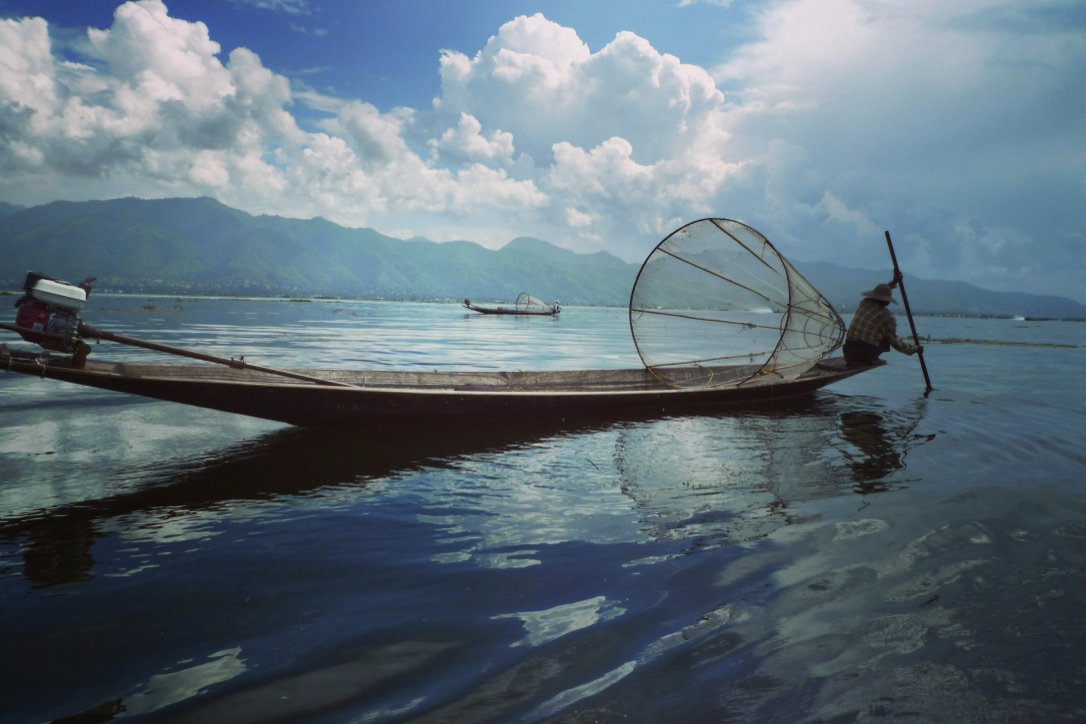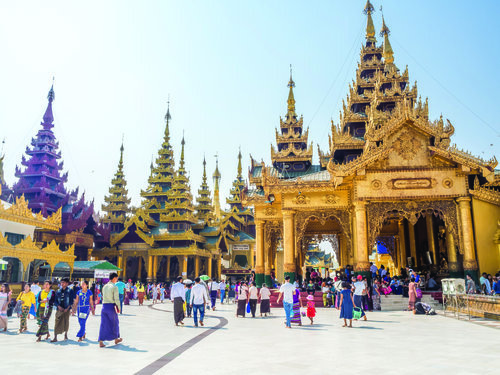The Land of the Golden Pagodas
“This is Burma, and it will be quite unlike any land you know about.”
Letting Go
Expecting the unexpected, letting go and more broadly, living in the present moment (what they call "mindfulness"), have been goals of mine for the better part of my adult life. These goals led me to quit my job in Paris, pack up my belongings, and say goodbye to the city I called home over the previous 8 years. So, just weeks after picking up my newly minted French passport, I shipped my belongings to Oklahoma, ate my last pain au chocolat and made my way to Shenzhen, China, the first stop in a nearly year-long adventure across the frontiers of Asia.
The kind of travel I dreamt of required living in the moment. It couldn't be had by excessive planning or reading other people’s travel blogs or following predetermined itineraries. I wanted to be a traveler, not a tourist. I craved authentic experiences, which only a perfect combination of chance, openness, and spontaneity could bring about.
Planning is as instinctive and necessary for me as breathing. So, quite naturally, I had to ‘plan’ for this unplanned adventure in order to make it actually happen--and it had to be in a relatively under-discovered place, if any such places still existed. After some time spent lazing about the beaches of Thailand, temple hopping in Cambodia, trekking in Nepal and drinking tea in Sri Lanka, I craved a more explorer-style adventure. I did a little research, bought a couple of plane tickets, and made my way to Yangon, Myanmar, with no real itinerary in mind aside from a ticket out of Mandalay the day before my tourist visa expired 30 days later.
Once Upon a Burma
Myanmar might appear a surprising choice of destination for some. After all, it is perhaps more known for political unrest and human rights abuses than tourism and only recently opened up to visitors after more than 50 years of self-imposed isolation. With an uncertain and evolving political landscape, the tourism sector remains wholly underdeveloped and visitors are relatively few and far between. If modern conveniences like cell phones and internet are now somewhat common in cities and towns, large parts of the country remain disconnected. The feeling you have is of a country slowly and painfully progressing to the modern era and still very much in transition.
But for the intrepid traveler, it is a paradise of potential: a place seemingly frozen in time, a land of glittering pagodas and traditional lifestyles. Here I could expect to encounter men wearing the traditional sarong-like longyi, their mouths stained red after a lifetime of betel nut, and women with faces covered in a yellow-white paste called thanaka. I knew I had to dress conservatively (no shorts or uncovered shoulders) and prepare myself for travel either via lengthy, vomit-inducing bus rides on bumpy roads or, in small towns, via horse and cart.
And so on a balmy day in October 2015, I landed in Myanmar with no predetermined agenda aside from a two nights booking in a hostel in Yangon.
The Golden Pagoda
For my first activity, I made my way to one of Myanmar's most celebrated sites, the Shwedagon Pagoda, a 2,600 year old Buddhist temple and site of pilgrimage for the pious who come to pay respect to the eight hairs of Buddha said to be enshrined here.
In a country boasting thousands of Buddhist temples, Shwedagon is considered one of the most important. "Shwe" means golden - an apt prefix for a 326-foot tall stupa whose 4,531 diamonds and 27 metric tons of gold plates shine and glow against the city skyline.
A visit to Shwedagon is a total sensory experience.
One enters the temple by removing their shoes and walking up one of four entrance stairways alongside fortune tellers, money exchangers, and stalls selling offerings such as flowers, incense, candles or, alternatively, more commercial goods, such as tee-shirts, toys, and clothes.
The pervasive smell of incense imbues the place with a kind of mystical atmosphere. Pilgrims from across the country come here to pay respects and make offerings to the Lord Buddha. For others, it’s a social gathering place--a favored spot for picnic lunches, naps or conversation amongst friends and family.
It is recommended to visit at sunset, when the site takes on an especially ethereal golden hue, and, on a more practical level, to avoid the unpleasant stone hopping required during the day to avoid scalding your bare feet against the unshaded parts of the marble terrace.
Exhausted from the crowds, the humidity, and the foreignness of it all, I made my way to a covered pavilion to rest aside clusters of betel-nut chewing locals. I sat quietly, cooling my feet against the covered marble floor and pretended to read my guidebook--any capacity to absorb facts and figures having evaporated from my body via copious pools of sweat many hours before.
It was time to people-watch. I exchanged a few friendly glances with some of the young monks sitting nearby who were looking inquisitively at me, and I could tell they wanted to come over and chat, so I smiled encouragingly back. This was perhaps the one and only advantage I can cite of being a solo female traveler---I appeared harmless, even accessible or approachable to curious locals.
My New Friend
Most Burmese have had so little contact with foreigners; they delight at the opportunity to practice their English with someone, even if only for a few minutes. Eventually one of the young monks came over and his friend soon joined him, and we spent the next couple of hours together attempting to communicate as they showed me around the temple.
One of the two, a 24-year-old monk named Sivanada, invited me to visit his monastery the next day and proposed to take me around the city. I had no plans (per my adventure in not-planning), and he seemed sincere enough, so I took down the address of his monastery and agreed to meet him there the next morning. When I showed up the next day, he and his best friend, an 18-year-old girl named Nandar, were waiting impatiently, eager to practice their English and ask as many questions as possible.
We explored the city together over the next three days, and I let them take me wherever they wanted, having no real idea of where we were going or what the plan was. We visited monasteries and temples together, were hosted by several monks with tea and sweets (along with a midmorning nap!), and went to coffee shops, bookstores and museums.
An English Lesson
Nandar and Sivanada then, quite unexpectedly, asked me if I would visit their English school and tasked me for the comically vague goal of teaching the class how to communicate best in international English. But the experience was unforgettable.
The “school” consisted of a covered outdoor space with no less than 400 adult men and women and monks crowded next to each other on long benches. The teacher, held in godlike reverence by the students, was a Burmese man, shouting quite incomprehensibly through a microphone in a language I did not recognize to the class. The class was reading--quite unexpectedly-- a stapled photocopy of Dale Carnegie’s "How to Stop Worrying and Start Living". Nandar explained that the teacher was discussing the meaning of each page, and I could see all the students around me hanging on to every word and annotating their photocopied pages with notes.
It came time for my presentation/class, for which I still had no idea what to say or do, but like all the other times in my life I had to do something for which I was wholly unprepared, I just winged it. I started blabbering about where I came from and the neutralness of my accent and was met with a sea of blank faces. A lesson in the subtle variations in American accents was perhaps not a good choice for this group. So I tried again. I asked a series of questions giving sample responses after each: “What is your name?” “My name is Elizabeth,” I said (more blank faces). “E-liz-a-beth,” I tried again more slowly (even more blank faces). “Like the Queen,” I added finally. “Queen Elizabeth!” (This one finally worked). “How are you?” (“I am fine”), “How old are you?”, “Do you like studying English”--to which a handful of eager volunteers would readily stand up and provide answers. Some asked me a few questions, “Was I married?”, “Did I have children?” Many strangers often asked me these last two questions and always expressed surprise, even shock, when I said no. “But, why not?” they asked.
Searching for Wisdom
There seems to be a common perception here that if you are a foreigner, you know everything and are a master of every subject. This is perhaps why Nandar felt I was qualified to give an important presentation to their English class and Sivanada has asked me earnestly to come back to Myanmar in March to travel with him and Nandar to his village to "teach the children" there, something he and Nandar do once a year. He didn't ask my qualifications or tell me what to teach them, but he seems quite confident that since I am a foreigner with a foreign education, no challenge is too big.
Throughout the 72 hours we spent together, Sivanada inundated me with questions about the country I came from:
"How do they teach systems of values and justice in your country?"
"What is better for me to teach children, cooperation or competition?"
"What's more important for a country, education or economics?"
"How can I prepare myself for study in your country one day?"
They waited with bated breath for my answer to each question and hung onto every word. I chose my words very carefully - even as they attempted to mime every expression that came out of my mouth. At that moment, I wished I had studied harder in school and could have remembered everything I had ever read and could share all this knowledge with them because that's all they truly wanted - to learn as much as possible.
Soul Gazing
On our second day together, Sivanada told me that his father had taught him how to read someone's mind by looking at their eyes. He asked me shyly if I was interested, I removed my sunglasses, and he said he could already identify three things about me. Our gaze locked for one split second before I looked away, alarmed by the intensity of his regard and then Sivanada said three things about me that were so profoundly personal that I will not repeat them.
Unsettled to the extreme, I quickly returned my sunglasses to my face and gave a noncommittal but polite "thank you" to his revelation. He looked devastated, assured me that what he said was "without judgment" and asked me to please tell him if he had made a mistake. Thankfully, at that moment another person jumped in the conversation, and I was saved from the painful act of having to admit that he had seen deep into my soul, and that I had been unsettled by it.
Saying Goodbye
I was devastated to leave Yangon and my new friends, Sivanada and Nandar. They were so worried about me getting lost or encountering any difficulties, they insisted on accompanying me to the bus station (two hours outside of town) for my overnight bus to Moulmein. But, I knew I had to leave and that they were uprooting their lives to spend time with me, and I didn't want to impose further.
By now, I had been in the country less than a week, and I had fallen in love with it, and I knew 28 days would hardly be enough.



